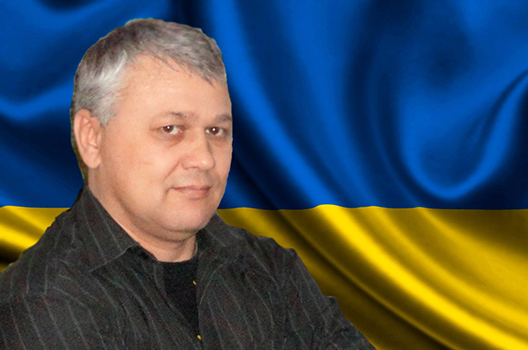 Vasyl Budik has spent eighty-six days as the hostage of Russian Lieutenant Colonel Igor Bezler, a rebel commander in southeast Ukraine. But not just any hostage. Budik has at times been Bezler’s intermediary with Ukrainian authorities and his spokesman to local media. He has the freedom to make a Skype call to a reporter – but no guarantee that he will get out of his predicament alive.
Vasyl Budik has spent eighty-six days as the hostage of Russian Lieutenant Colonel Igor Bezler, a rebel commander in southeast Ukraine. But not just any hostage. Budik has at times been Bezler’s intermediary with Ukrainian authorities and his spokesman to local media. He has the freedom to make a Skype call to a reporter – but no guarantee that he will get out of his predicament alive.
Budik is a citizen of Georgia, fifty-two years old. He and his Ukrainian wife have two children. Budik owns an internet business in the city of Horlivka, which since April has been controlled by Bezler’s militia.
Held with other captives in a government office building, Budik has been sleeping in a proper bed, allowed access to television and the internet. He has given interviews to the Ukrainian press and television programs via Skype. Heck, he even called me via Skype a couple of times once we established contact.
Hostage and Intermediary
Bezler’s militiamen seized Budik May 2 as he was at a shop in the city, buying bread. Bezler has been holding Budik, plus a Ukrainian Security Service (SBU) colonel and an army captain, among seventeen “show hostages,” according to Kateryna Serhatskova, a journalist who has written extensively about the war in Horlivka. Bezler, one of the Russian-backed insurgency’s main leaders, hoped to trade his captives for a Russian woman named Olga Kulygina, whom Ukrainian authorities arrested as she entered Ukraine with more than $20,000 in cash that they concluded was Russian state funding for the war in Ukraine.
Budik has become not only Bezler’s captive, but his intermediary and even at times his spokesman. He described how, in recent days, the Ukrainian Defense Ministry called him to pass on a request to Bezler for a cease-fire to let both sides to collect the bodies of those killed and rescue the wounded. “Bezler is an officer,” said Budik. “He told me ‘I don’t fight with the dead,’ and we arranged for a three-day cease-fire.”
In conversations over the past week, Budik described Bezler as “a man of his word.” He says this with a certain tone of respect.
Still, Budik has had reason to fear his captor. In early June, Bezler subjected Budik and another prisoner, a Ukrainian officer, to a mock execution that he videotaped and posted to the internet. In the video, Bezler addresses the camera, accusing the Ukrainian authorities of not keeping their word regarding a prisoner exchange. He threatens to shoot two prisoners every few hours unless the Ukrainian authorities release Kulygina. He then orders his gunmen to open fire, and the condemned men fall to the floor.
‘Executed’ on Camera
During the incident, “We stood for 40 minutes with our hands tied behind our backs facing the wall expecting to be shot at any moment” said Budik. He and his companion did not cry or panic, and Budik says this calm seems to have instilled in Bezler some respect toward them. But video cameras had already been invited and an execution of some sort had to follow, he said. Budik and his companion were told that the first volley fired would be with blank rounds, followed by a second volley, with live ammunition, forty seconds later. Budik and the Ukrainian officer were told, “If you fall to the ground within those 40 seconds, your lives will be spared.” They played their roles as instructed, bruising themselves in feigning their own deaths by collapsing with their arms tied behind them.
Budik acknowledges the inconsistency of his captivity and his praise, almost as a press secretary, for what he describes as Bezler’s honor. “Yes, it does seem like that at first glance, but I am a detained person and sometimes I am helping both sides to behave” he said in an interview.
Yesterday, Budik called to say that Bezler had fled Horlivka, leaving the hostages under the control of a junior officer. Before leaving, he had planned a prisoner exchange for today. Given the fighting in the city, it is unclear whether it will take place. Unfortunately for Budik, if it does, he will not be one of the hostages slated to be freed.
Irena Chalupa covers Ukraine and Eastern Europe for the Atlantic Council.
Image: Photo of Vasyl Budik via Facebook
